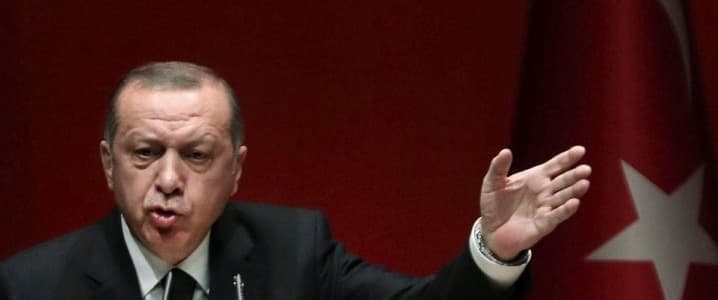Turkey’s location has always given it a key geostrategic advantage. Its proximity to the Middle East and the Caspian as well as its position on the Black Sea make it an indispensable member of NATO. In recent years, however, Ankara’s diplomatic relations with its Western allies have cooled. Now, the discovery of major energy deposits in the Eastern Mediterranean are adding to tensions.
Cyprus is one of the countries that could benefit significantly from the new-found natural gas wealth. The island nation currently imports all of its energy, but the discovery of gas deposits could improve Cyprus’ energy security while at the same time making it an energy-exporting nation. Nicosia’s fraught relations with its large northern neighbor, however, could hamper the development of its energy sector.
The Turkish invasion of 1974 separated the island between an internationally recognized Cyprus and the Turkish Republic of Northern Cyprus which is only recognized by Turkey. To make matters even more complicated, Nicosia is a member of the EU while Ankara’s membership request is still pending.
Turkey wants a share of the newfound energy wealth to go to the Turkish inhabitants of the island. Furthermore, Ankara has sent exploratory vessels to Nicosia’s EEZ which has evoked a sharp rebuke from the EU.
Brussels has made its position very clear, stating that Cyprus is an independent nation with widespread international recognition and that Turkey has repeatedly used force to deter energy companies from exploring the island nation’s EEZ.
Last week, the foreign ministers of the EU agreed on economic sanctions over Turkey’s actions in Cyprus’ waters. These include asset freezes and travel bans. Also, technical and material support for drilling activities is prohibited. The recent decision follows a previous round under which arms sales were banned following the country’s invasion of Syria.
But there is only so much the EU can do when it comes to influencing Ankara’s decision making. Turkey is sheltering approximately 3.5 million displaced persons. The EU is providing financial support to Ankara in exchange for preventing the continuation of the refugees’ journey to Europe. President Erdogan has already threatened to flood Europe with the displaced persons who for several years have called Turkey their "home". According to some Greek officials, Ankara has the capability to immediately “send” 500,000 refugees over into Europe. Related: Houthis Rebels Hijack Saudi Ship Carrying Oil Rig
More importantly, thousands of detained ISIS fighters are currently in Turkish jails or under the supervision of Turkey-backed Arab fighters in Syria. Ankara is calling on European countries to allow the radicalized citizens to return to their country of origin to face trial there. Domestic political developments in several European countries, however, hamper the processing of “home-grown” Islamic terrorists.
Turkey is aware of its advantage vis-à-vis the EU and it is not shy of exploiting it. Erdogan has remained rebellious in the face of increased economic and political headwinds domestically and abroad. During a state visit to the U.S., Turkey’s president warned the EU that it could send a flood of refugees and detained terrorists across the border.
According to Erdogan "Turkey is not one of those countries you have come to know until now. We are a country that sits at the negotiating table with you." Ankara's ascension talks with the EU have been in stalemate for years now and membership is increasingly looking like a fantasy.
It is unclear how Turkey will exploit potential gas discoveries when Western energy companies are not allowed to share technological knowhow. Ankara could turn to Russia's state-owned energy companies who are under Western sanctions themselves and therefore would be willing to make a deal with Ankara. However, Moscow historically has enjoyed good relations with Cyprus due to their shared Orthodox religion. Consequentially, it remains uncertain how Russia will play this geopolitical conundrum.
Realistically, Turkey’s options here are limited. Despite the fraught relations, the country remains a member of NATO and its most important economic partners are Western countries. Therefore, Ankara will most likely choose to deescalate before matters go out-of-hand.
By Vanand Meliksetian for Oilprice.com
More Top Reads From Oilprice.com:
- Goldman: Go Long On Fracking
- The Worst Is Over For Oil Markets
- U.S. Shale To Break Records Despite Bearish Rhetoric



















The second objective is to ensure that the Turkish Cypriots get a fair share from the new-found natural gas wealth in Cypriot waters.
The third objective is to prevent the building of the EastMed gas pipeline which is supposed to bring Israeli and Cypriot gas supplies under the Mediterranean to Greece and from there to the EU. However, the EastMed will never see the light of day because of high costs and lack of enough gas supplies to fill it.
The economic sanctions agreed by the EU over Turkey’s actions in Cyprus’ waters have no bite. Turkey has a stronger hand to play against the EU. It can easily flood the EU with thousands of displaced people currently sheltering in Turkey.
That is why Turkey will prevail in the gas dispute with Cyprus as it did with its military incursion into Syria despite threats of sanctions by President Trump.
Dr Mamdouh G Salameh
International Oil Economist
Visiting Professor of Energy Economics at ESCP Europe Business School, London